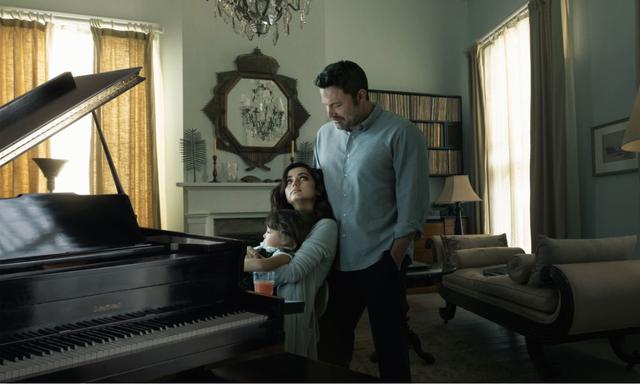‘Deep Water’ is the latest in the proud Hollywood tradition of two big stars falling in love after acting opposite each other on the set of a film.
In history, you have Elizabeth Taylor and Richard Burton on ‘Cleopatra’, Tom Cruise and Penelope Cruz on ‘Vanilla Sky’, Humphrey Bogart and Lauren Bacall and ‘To Have and Have Not’, and now Ben Affleck and Ana De Armas can be added to the fabled list.
This bit of celebrity gossip is worth mentioning because for two actors who are supposed to be playing husband and wife in ‘Deep Water’, there is negative chemistry.
There is a narrative justification for this - the couple are on the brink of divorce - but considering the entire film hinges on their relationship, it undermines the film straight away.
When the fundamental premise of the film falls apart just by looking at your two stars, something has gone horribly wrong.
The United Nations may have to be called into an emergency session to figure out what the hell went wrong here.
It’s been nearly 20 years since director Adrian Lyne made a film, and there were hopes that Lyne could capture the same magic that made ‘Fatal Attraction’ the biggest film of 1987.
The first of the film's litany of problems start with Lyne: the Englishman has forgotten all the fundamentals of filmmaking.
Lyne hasn't made a film since 2002's 'Unfaithful' with Diane Lane, and when Affleck and De Armas display their stringent anti-chemistry, you'll be left wondering if this was the same director that gave us 'Fatal Attraction, 'Indecent Proposal' and '9 1/2 Weeks'.
Lyne is like when a seasoned football manager is brought in to fix a team mid-season, and it soon becomes apparent that the problems can't be fixed by a change in manager.

Plot points are introduced and dropped, characters are introduced and never show up again, Ana De Armas’ accent changes in alternate scenes, and perhaps the biggest hit against an erotic thriller, it’s decidedly unsexy.
For a film that purports to be an erotic thriller, it has all the eroticism of ‘Showgirls’, and when that film is invoked early on in a review, alarm bells should start ringing.
A decade from now, ‘Deep Water’ will be reclaimed as a cult masterpiece to be enjoyed with friends with its own drinking game or themed dress-up screenings like ‘The Room’ or ‘The Rocky Horror Picture Show’ before it.
The non-existent chemistry between Affleck and De Armas may or may not be intentional, and to give the pair credit, they try to make the material work.
After a while, the film becomes hypnotic in how strange and off-kilter its pacing is.
Casting Call
Affleck is one of the best at pulling off calculating, unaffected too-handsome men while De Armas has developed a good line in playing manipulative and deceitful characters.
Ben Affleck stars as Vic Van Allen, the man who seemingly has it all with a nice house, has enough money to never work a day in his life, and a wife and kid.
Affleck shook off the reputation he was merely a pretty boy actor in David Fincher’s ‘Gone Girl’ with the masterstroke of that film being the leaning in on the inherent too-slick factor of Affleck.
Ana De Armas co-stars as his wife Melinda, a multi-layered woman who switches from a tender, caring mother to a controlling mastermind at the flick of a switch.
On paper, pairing Affleck with ‘Fatal Attraction’ director Adrian Lyne and rising superstar like Ana De Armas seems like a slam dunk, but ‘Deep Water’ confounds all expectations by trying to be 6 different films in one.

‘Deep Water’ is based on a novel of the same name by Patricia Highsmith, who of course had her ‘Talented Mr Ripley’ adapted into a blockbuster in 2000, and the film tries to strive for that same brand of callous and cold tone that Highsmith pulls off so effortlessly in her book.
'Deep Water' controls tone the same way a hyperactive child controls a water hose.
One scene is a Mike Nichols style exploration of the mundanities of suburbia, the next is a David Fincher psychological thriller, the scene preceding that is a kids film about the importance of having a good relationship with your parents.
Sam Levinson is one of two credited screenwriters on this, and to Levinson, the word “subtlety” does not exist.
Viewers of ‘Euphoria’ will be aware that Levinson puts the b in subtle and ‘Deep Water’ has all of his worst traits on display.
Scenes will be bubbling along semi-competently until a character says something that throws the entire film off-balance.
The dialogue in the film sounds like the film playing off-screen in an episode of ‘Seinfeld’ that is probably being watched by George.
Characters speak to each other in a very stilted and forced way that smacks of the screenwriters trying to emulate John Cassavetes but ends up having more in common with an edgy Leaving Cert paper 1 short story.
The "erotic" lines in this so-called erotic thriller are over-written and delivered with a strange anti-energy you begin to wonder if the film is one big Andy Kaufman style practical joke.
By the middle of the film, you stop caring about the film as a legitimate thriller and it becomes that scene in 'Ed Wood' where the studio executive is watching 'Glen or Glenda' and is convinced he's having a prank played on him.
Affleck and De Armas aren’t entirely to blame for the debacle, but their odd acting choices end up underpinning the films Lynchian feel.
De Armas' stock has been on the rise since 'Knives Out' and 'No Time To Die', but her wildly off-base performance where her natural accent dips in and out depending on the scene is the kind of performance that could derail a career.
Affleck's role demands a lot of him, and ultimately the role stretches him too thin.
Last year Oscar Isaac played a similarly disturbed character in Paul Schrader's superb 'The Card Counter' and the role would have been at least functional with an actor who has the same sense of pathos as Isaac.
Write Off
The film manages to settle into a rhythm of one scene with Affleck, one scene with De Armas, and then the two’s storylines intersect.
After a while, the pacing becomes somewhat hypnotic, and you’re left on the edge of your seat to see what bananas plot development happens next.
‘Deep Water’ manages to wear you down and places you in a state of “let’s see where this goes” which is something that can’t be said for most films.
You’ll want to keep watching just to see what plot twist, nonsensical character development or totally jarring dialogue the film pulls out of thin air.
The film differs from the book in a pretty substantial way, and to the film's credit, you are left wondering how it ends.
The greatest compliment the film gets is that with 20 minutes to go all the plot threads are left unresolved, and you want to see how the film ends.
Despite spending the last 1000-or-so words verbally assassinating the film, there is a lot to recommend with ‘Deep Water’.
The term “so bad it’s good” is a cop-out among writers, and in this instance, ‘Deep Water’ is so fundamentally broken as a film it somehow warps all the way around to being good.
A film that is boring and bad is infinitely more of a chore to review than something like ‘Deep Water’, which has enough bizarro anti-chemistry between the leads to keep viewers on board.
With any luck, this film will develop a cult reputation among fans of Affleck or De Armas, or fans of bad films in general.
In spite of our rating, we would recommend 'Deep Water' purely for how big of a failure it is.
A film of this incompetence almost rarely gets made at a studio level anymore, and in the era of Marvel films being committee-designed and afraid to make big gambles, films like ‘Deep Water’ should be cherished for the beautiful disasters that they are.





















































































